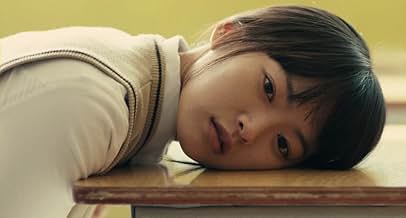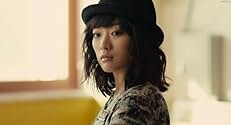IMDb-BEWERTUNG
7,2/10
3032
IHRE BEWERTUNG
Han Gong-Ju wechselt an eine neue Schule, um ihrer Vergangenheit zu entkommen. Es dauert lange, bis sie von ihrer schwierigen Vergangenheit eingeholt wird, aber als sie es tut, ist die Enthü... Alles lesenHan Gong-Ju wechselt an eine neue Schule, um ihrer Vergangenheit zu entkommen. Es dauert lange, bis sie von ihrer schwierigen Vergangenheit eingeholt wird, aber als sie es tut, ist die Enthüllung verheerend.Han Gong-Ju wechselt an eine neue Schule, um ihrer Vergangenheit zu entkommen. Es dauert lange, bis sie von ihrer schwierigen Vergangenheit eingeholt wird, aber als sie es tut, ist die Enthüllung verheerend.
- Auszeichnungen
- 29 Gewinne & 14 Nominierungen insgesamt
Empfohlene Bewertungen
Han Gong Ju is a young school girl who is suddenly up rooted from her home and taken to a new district to live and attend a new school. All we know is that there has been 'a scandal' at her old school and that she was directly involved. Her school teacher takes her to live with his mother - who runs a little supermarket.
Han Gong Ju then tries to rebuild a life devoid of the past, but her curious detachment acts as a lure for some of her new class mates and try as she might the past always has a strange way of catching up with us.
This is probably a slow burner, but the direction and pacing make it feel more immediate than it actually is. The performances are all sufficiently nuanced to keep one guessing as to what really happened and as such the past is done in a slow reveal through flash backs. The back story could have been fleshed out better but once gain we have enough hints and subtle asides that help put all the pieces together. This is one where your full attention is required, but that is quite easy as it is very gripping. Another great piece of cinema from South Korea.
Han Gong Ju then tries to rebuild a life devoid of the past, but her curious detachment acts as a lure for some of her new class mates and try as she might the past always has a strange way of catching up with us.
This is probably a slow burner, but the direction and pacing make it feel more immediate than it actually is. The performances are all sufficiently nuanced to keep one guessing as to what really happened and as such the past is done in a slow reveal through flash backs. The back story could have been fleshed out better but once gain we have enough hints and subtle asides that help put all the pieces together. This is one where your full attention is required, but that is quite easy as it is very gripping. Another great piece of cinema from South Korea.
I just finished watching this unique movie and - I have to put this out there before saying anything else - huge trigger warning for sexual assault and related traumatic events.
That said, and despite the trigger warning, one of the major strengths of the movie is its sensitive and non-exploitative treatment of what is, by all accounts, a harrowing and deeply painful subject. The writing, direction, editing, and performances are all commendable in how impressionably but carefully they expose rape culture and the costs it imposes on its victim-survivors. Indeed, the movie does what very few of its kind manage to do: to communicate the horrors and harms of rape and of its aftermath to audiences while avoiding catering to the male gaze and sexually objectifying its female characters, or exploiting its female characters in other ways purely for the male audiences' entertainment.
As a consequence, Su-jin Lee and his crew succeed, in a way that is rarely seen in cinema, to show just how hard coming out with a rape allegation is to victims of sexual assault and/or rape and how existing patriarchal institutions and agents all work together to ensure that this remains the reality for victim-survivors. And this is so, to a large part, due to the centering of the narrative on Han Gong-Ju's mental and social life; the award-worthy editing that shifts between Gong-Ju's present and past often without prior indication; and the emotionally laden performance by Chun-Woo-He (Hann Gong-Ju) who most often does not even have to speak to communicate her motivations and emotions to the viewer. Some would attribute these strengths to the particulars of Korean drama filmmaking in general but, as someone who's watched a number of classic Korean drama movies, I'd object to this and argue that due credit should be given to the creators of this unique and woefully under-watched and underrated classic.
In all, this is a movie that I would recommend to almost everyone for artistic, educational, sociological, entertainment, and moral reasons because, I guarantee, it has something for nearly all viewers, no matter their interests and motivations in movie-watching and in social and educational issues. The only negatives I noted in the movie include its promotion of alcohol and cigarette use and its plot development with regards to how the editing is used as a narrative tool (which takes a while to get used to while watching it).
That said, and despite the trigger warning, one of the major strengths of the movie is its sensitive and non-exploitative treatment of what is, by all accounts, a harrowing and deeply painful subject. The writing, direction, editing, and performances are all commendable in how impressionably but carefully they expose rape culture and the costs it imposes on its victim-survivors. Indeed, the movie does what very few of its kind manage to do: to communicate the horrors and harms of rape and of its aftermath to audiences while avoiding catering to the male gaze and sexually objectifying its female characters, or exploiting its female characters in other ways purely for the male audiences' entertainment.
As a consequence, Su-jin Lee and his crew succeed, in a way that is rarely seen in cinema, to show just how hard coming out with a rape allegation is to victims of sexual assault and/or rape and how existing patriarchal institutions and agents all work together to ensure that this remains the reality for victim-survivors. And this is so, to a large part, due to the centering of the narrative on Han Gong-Ju's mental and social life; the award-worthy editing that shifts between Gong-Ju's present and past often without prior indication; and the emotionally laden performance by Chun-Woo-He (Hann Gong-Ju) who most often does not even have to speak to communicate her motivations and emotions to the viewer. Some would attribute these strengths to the particulars of Korean drama filmmaking in general but, as someone who's watched a number of classic Korean drama movies, I'd object to this and argue that due credit should be given to the creators of this unique and woefully under-watched and underrated classic.
In all, this is a movie that I would recommend to almost everyone for artistic, educational, sociological, entertainment, and moral reasons because, I guarantee, it has something for nearly all viewers, no matter their interests and motivations in movie-watching and in social and educational issues. The only negatives I noted in the movie include its promotion of alcohol and cigarette use and its plot development with regards to how the editing is used as a narrative tool (which takes a while to get used to while watching it).
Korean film has been pretty tough on its homeland. Much non-romantic lore of late handles mishandled or downright criminal police procedure or judiciary mistakes, and/or rape and abuse based on true stories. Other than the impeccable technical credits one has gotten used to in Korean film, most of these films impress by a story-driven writing that has become somewhat lost in Western film, where drama tends to involve more of the individual actor's abilities of expression - that makes them sometimes a little emotionally overwrought to Western viewers; examples for this may be 'Way back home' (2013) or 'Sea Fog' (2014), which are very good films but sometimes overdo things a bit.
'Han Gong-ju' is different. It focuses almost entirely on its principal character, played with outstanding reservation by Chun Woo-hee. The story jumps unpredictably back- and forwards, making it initially quite hard for the viewer to follow. But what may seem a weakness is actually the film's greatest strength, because the viewer is left with no choice but to follow the events through Gong-ju's own eyes - therefore the ugly truth, once revealed, hits twice as hard as it normally would because the various tensions in the plot are allowed to build up slowly. The only weakness in my opinion is the actual scene of the crime, which could have been edited more respectfully, but then again this is a graphic age we're living in.
In short, this is an exceptional character-driven piece about the most difficult subject of all to handle in film. A must for any serious cineast, but not for the faint of heart.
'Han Gong-ju' is different. It focuses almost entirely on its principal character, played with outstanding reservation by Chun Woo-hee. The story jumps unpredictably back- and forwards, making it initially quite hard for the viewer to follow. But what may seem a weakness is actually the film's greatest strength, because the viewer is left with no choice but to follow the events through Gong-ju's own eyes - therefore the ugly truth, once revealed, hits twice as hard as it normally would because the various tensions in the plot are allowed to build up slowly. The only weakness in my opinion is the actual scene of the crime, which could have been edited more respectfully, but then again this is a graphic age we're living in.
In short, this is an exceptional character-driven piece about the most difficult subject of all to handle in film. A must for any serious cineast, but not for the faint of heart.
This film is horrible in the best way possible. The lead has been through so much but still continues to move forward creating a new life for herself. Although this film is absolute heartbreaking the message it conveys is beautiful. There were times when I laughed and times my heart absolutely broke for Gong-ji, I hate how hard her life's been at such a young age but I'm also so happy she prevailed through the tough times. During some flash backs I was a little confused but surprised how well they blended together so nicely. I would 100% recommend this to a more mature audience as it's definitely not for ages under 16. Overall this is an amazingly heartwarming and breaking film.
Han Gong-Ju was emotionally devastating. The storytelling was skillful and while it was easy to figure out what the central event was, the details only began to unravel as the story progressed, resulting in a captivating plot that culminated in some very heartbreaking scenes. Chun Woo-Hee's performance was arresting and the film's harrowing subject matter was handled delicately yet made all the more disturbing by the fact it's based on a real incident.
Wusstest du schon
- WissenswertesThis movie was inspired by the infamous Miryang gang rape case of 2004 in South Korea.
Top-Auswahl
Melde dich zum Bewerten an und greife auf die Watchlist für personalisierte Empfehlungen zu.
- How long is Han Gong-ju?Powered by Alexa
Details
Box Office
- Weltweiter Bruttoertrag
- 1.614.237 $
- Laufzeit1 Stunde 52 Minuten
- Farbe
- Sound-Mix
Zu dieser Seite beitragen
Bearbeitung vorschlagen oder fehlenden Inhalt hinzufügen























